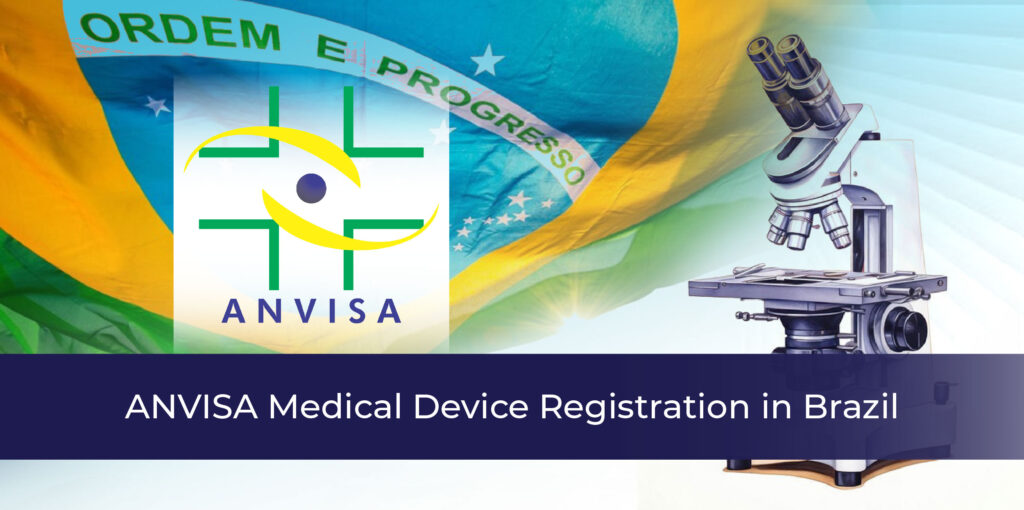ANVISA Medical Device Registration in Brazil
Overview of ANVISA Medical Device Registration
Brazil has emerged as one of the fastest-growing markets for medical devices in Latin America. To market and sell medical devices in Brazil, manufacturers must comply with the regulations of ANVISA (Agência Nacional de Vigilância Sanitária), the Brazilian Health Regulatory Agency.
The ANVISA Medical Device Registration in Brazil ensures that your products meet safety, quality, and performance requirements before entering the market. Depending on the device classification, manufacturers need to follow different registration pathways, ranging from simplified notification to detailed technical dossiers.
Why ANVISA Registration is Important?
- Ensures compliance with Brazilian regulatory requirements
- Grants market authorization for device commercialization
- Enhances product credibility and acceptance
- Helps in smooth distribution across Brazil’s growing healthcare market
Let's Grow Your Business Together
Medical Device Classification in Brazil
ANVISA classifies medical devices into four classes based on risk:
- Class I (Low risk)
- Class II (Medium risk)
- Class III (High risk)
- Class IV (Highest risk)
The higher the risk class, the more stringent the regulatory requirements for approval.

Appointing a Brazilian Registration Holder (BRH)
Foreign medical device manufacturers without a physical presence in Brazil are required to appoint a Brazilian Registration Holder (BRH). The BRH acts as your official local representative and is responsible for:
- Submitting your device registration application to ANVISA
- Maintaining control of your device registration certificate
- Managing Brazilian Good Manufacturing Practice (B-GMP) certification, where applicable
Choosing an independent BRH rather than relying on a distributor provides greater flexibility, as it allows you to switch distributors anytime without affecting your device registration status. This ensures full control over your regulatory compliance and long-term business operations in Brazil.
INMETRO Certification Requirements in Brazil
In addition to ANVISA registration, certain medical devices must also be certified by INMETRO (The National Institute of Metrology, Standardization, and Industrial Quality), the authority responsible for technical standards and product conformity in Brazil.
INMETRO certification is commonly required for:
- Electro-medical devices subject to IEC 60601 standards
- Medical devices involving electrical safety and performance requirements
- Specific categories of devices defined under Brazilian technical regulations
This certification ensures that medical devices meet Brazilian safety and quality standards before they can be marketed.
Steps for ANVISA Medical Device Registration in Brazil
- Determine Device Classification – Identify whether your product falls under Class I, II, III, or IV.
- Appoint a Brazilian Registration Holder (BRH) – Mandatory for foreign manufacturers to represent them locally.
- Prepare Technical Documentation – Including device description, safety data, labeling, and clinical evidence (if required).
- Quality Management System (QMS) Compliance – ANVISA often requires compliance with Brazilian GMP (Good Manufacturing Practices).
- Submission & Review – ANVISA reviews the application, verifies documents, and may request additional data.
- Approval & Market Authorization – Once approved, the device is eligible for commercialization in Brazil.
Looking to Register Your Medical Device in Brazil?
Our Services
At Operon Strategist, we provide complete regulatory consulting for medical device manufacturers entering the Brazilian market. Our key services include:
- ANVISA Medical Device Registration – Device classification, dossier preparation, and submission
- Brazilian GMP (B-GMP) Support – Guidance for compliance and certification
- INMETRO Certification – Assistance with safety and performance testing requirements
- Brazilian Registration Holder (BRH) Support – Coordination with local representatives
- Quality Management System (QMS) – ISO 13485 and global compliance support
- Turnkey Consulting – Setup of medical device manufacturing facilities
- Training & Compliance Updates – Regulatory workshops and ongoing guidance
With Operon Strategist, you get end-to-end solutions for smooth and compliant market entry in Brazil.
FAQs
Why is ANVISA registration necessary to sell medical devices in Brazil?
ANVISA registration ensures that your medical device meets Brazil’s strict safety, quality, and performance standards. Without registration, you cannot legally market or distribute medical devices in the country. It helps protect patient health and ensures compliance with local regulations.
Do foreign manufacturers need a local representative to register their device in Brazil?
Yes. Foreign manufacturers must appoint a Brazilian Registration Holder (BRH) to represent them in Brazil. The BRH handles the submission of documents, maintains registration certificates, and ensures ongoing compliance with ANVISA regulations.
What is the role of INMETRO certification in medical device registration?
For certain devices, especially those involving electrical safety like ECG machines, INMETRO certification is required. It confirms that the product meets Brazilian technical and safety standards, ensuring regulatory approval alongside ANVISA registration.